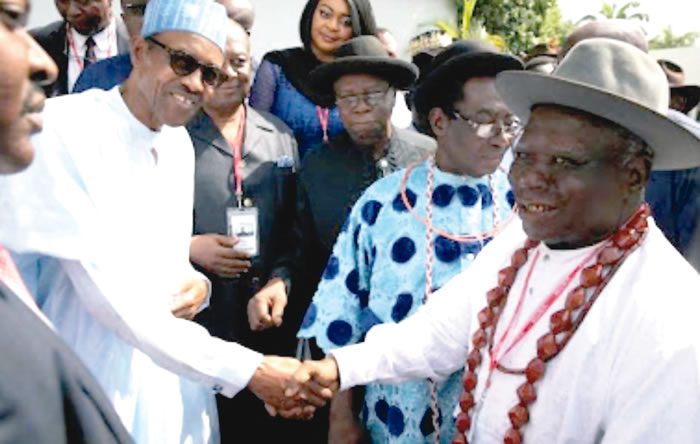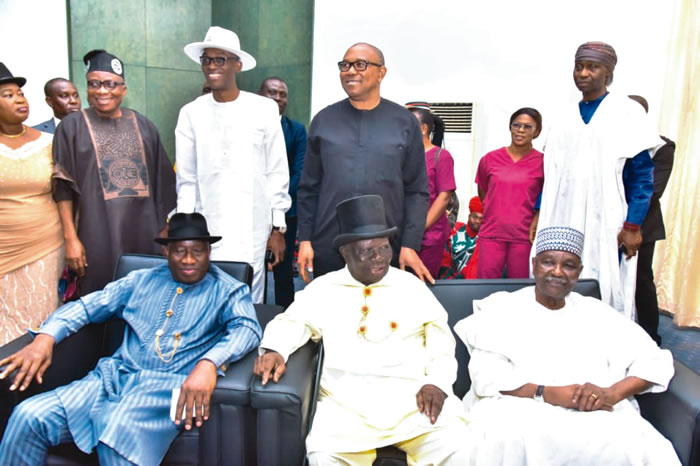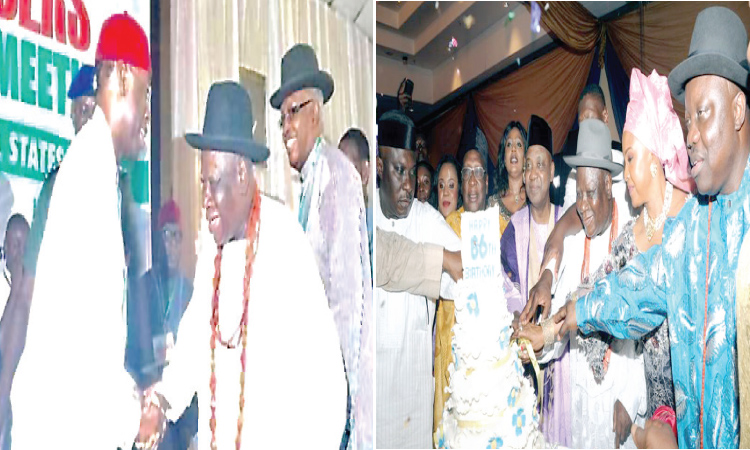MONDAY night, another great heart stopped breathing. Pa Edwin Kiagbodo Clark took a flight to eternity barely a few days after his close ally, compatriots and companion, Pa Ayo Adebanjo exited. Ironically, both men were the joint leader of the Southern and Middle Belt Leaders Forum (SMBLF). Like a Siamese twins, Pa Clark and Pa Adebanjo led other like-minds to champion the cause for a new Nigeria, where justice, equity and fairness will prevail.
For Clark, his death hit many like a thunderbolt. Just 72 hours earlier, the leader of the Pan-Niger Delta Forum (PANDEF) had signed the SMBLF condolence message on the demise of his close ally in the crusade for a just society. In the message, Clark and the other leaders of the forum had said the exit of Pa Adebanjo marked the end of an era. The statement of the body was signed by Pa Clark, Ohaneze President General: Senator Azuta-Nbata, PANDEF Presidents General: Ambassador (Dr) God knows Igali, President Middle Belt Forum: Dr Pogu Bitrus and the Coordinator, Chief John Nnia Nwodo. Expressing the vacuum likely to be created by the demise of Pa Adebanjo, the leaders lamented: “His absence will be profoundly felt, as his voice was always one of reason, courage, and foresight. Chief Adebanjo’s life was a beacon of integrity, justice, and unwavering commitment to democratic principle.” While performing that task of leading other compatriots in paying glowing tributes to Adebanjo, Clark did not know that death was lurking by the door.
Conscience of the people
Born on May 25, 1927 in Kiagbodo in Delta State, Clark was a beacon of hope, symbol of courage and exemplary leadership. Many people see him as the true conscience of the Ijaw Nation and a bridge builder in Nigeria. Conscious of the fact that charity begins at home, he staked all he had to defend the interest of the people and indeed the entire Niger Delta region without compromising national unity, progress and prosperity of the country. He was dogged in the quest by Nigeria to entrench the ideals of federalism, given its ethnic heterogeneity. So, he fought gallantly against the obvious exclusivity of political power to a section of the country. He once queried: “They have been ruling this country for almost 40 years. Nobody worried. Are we second class citizen in this country? No! Everybody is equal.”
From the cradle to the grace, Clark also towered above his peers. In life, he was a constant star in the battle for renaissance after the country began to drift to the chagrin of Clark and other members of his first generation of Nigerian leaders. In death, the avalanche of encomiums and accolades about his times underscored his enviable legacies as a statesman and prodigious leader cum lawyer. Clark attended primary and secondary schools at Effurun, Okrika and Afugbene, before proceeding to the Government Teachers’ Training College. He later went abroad to study Law. The greater part of his sojourn on earth was devoted to the cause of guaranteeing justice for the people of the Niger Delta region. He was the Federal Commissioner for Information during the regime of the former Head of State, General Yakubu Gowon in the 1960s; member of an advisory committee to the then military Governor David Ejoor of the Mid-Western Region province and Federal Commissioner of Information in 1975. Clark founded the Edwin Clark Foundation and established a university in his hometown, contributing to the educational advancement of the region. His influence transcended ethnic and regional boundaries, earning him respect as a national figure who stood firmly for justice, equity, and the rights of marginalized communities.
Life in the village
His family has a history of longevity. In one of his interviews, Clark spoke on the subject matter with an uncommon relish, when he marked his 90th birthday, giving an insight into his parentage. He said: “Turning 90 was a good feeling. Initially, I didn’t plan to celebrate my 90th birthday because I regarded it as one of those ordinary years. But two things made me accept the celebration. Looking at my family tree starting from my great-great-grandfather, Chief Bekederemo Ogehi, who was wealthy, being the first man to buy a ship in Nigeria from John Holt (it was recorded in an archive in Ibadan) died in 1926 at the age of 80. Also, my grandfather, Chief Fuludu Bekederemo, a prominent chief who had been attending chief’s conferences as far back as 1941 in Ibadan, also died in his 80s. My father died in 1963 at 85; and my mother died the same year, aged 84. Having thought about this, I considered myself as the luckiest to live up to 90 years in the family.” Clark also spoke on his life in the village where he was born and brought up. He recalled: “I was born on May 25, 1927 in my mother’s village, Erunwarin, now in Ughelli South Local Government of Delta State. My father had always been a businessman and my mother was a trader. My paternal and maternal grandmothers were also traders. My maternal grandfather was a famous chief in the area at that time. I lived with my grandmother in the village. When she died, I went to live with my mother’s elder brother, Okori. He was a fisherman and I used to help him. I remember a day he came back very early in the morning and asked me to go to the river to carry the fish he had caught. When I got there I was looking at the fish and didn’t know that one of them was alive. I carried it and it slipped out of my hand and went into the river. I stayed back at the riverside, crying. When my uncle didn’t see me, he came over and met me crying. He said I shouldn’t worry that he would catch it for me the following day. Life as a village boy was interesting. There was no electricity and there were no chairs. They built mud stool around the walls; they would put mats on it and we would sit.”
Challenges of going to school
Like a few of his contemporaries then, Clark did not begin formal education until he was eight years old. There was no school in the area, where he could enroll. Following the death of his maternal grandmother in 1935, his father took him to his hometown in Kiagbodo. From then, his life began to witness a remarkable turnaround along with his siblings. “When we got to Kiagbodo, my father decided to send us (my younger brothers and I) to his mother’s place in Efunrunto. My late brother, Godfrey, Ambassador P.A Clark, Professor J. P. Clark and I were all sent to school the same day. Prior to that time, we were bearing our native names. But one day our teacher, one Thompson Okitipi, an Urhobo called us and said he was going to give us English names. He gave me Edwin, he gave my brother who died in 1986, Godfrey; he named my third brother, and Prof. Pepper Clark, Johnson. Mr. Okitipi was the only teacher in the whole school teaching from Elementary One to Four. We were in this school until 1940 when my father came and took us to a newly opened school in Okrika along the River Niger. He said his father (my grandfather) had sent 11 of his children to the same school. We had to go to the school by canoe. We were quite young but my father approached one man called Yepe and said he wanted us to live with him. This man gave us one of his rooms and my father paid. We stayed in this room cooking and looking after ourselves. My father would bring all the foodstuffs. And because the school was not accredited to run Elementary Five and Six, in 1942, my father again took us to another school, Central School in Akogbene where I eventually finished Elementary Six,” he recalled.
Why he decided to study law
Clark also revealed how he as the village boy found his way into the legal profession. He left the civil service in 1961 having acquired the building blocks of formal education, to study Law. He talked about the inspiration to pursue a degree in law thus: “My grandfather and my father, as businessmen, always had one case or the other and we used to go to High Court in Warri. I always admired lawyers because they dressed well. The likes of Ayoola, FRA Williams, and Kayode Eso used to come to Warri. There were other lawyers like Chike Idigbe, Okorodudu, and Mbanefo, who later became Supreme Court judges. These lawyers dressed very well and I admired them. One day, my grandfather’s lawyer had a very big argument in court with Chike Idigbe as the opponent. Immediately they finished the case, he (Idigbe) came out and held his client’s hand and two of them were laughing. My grandfather was like these people have connived and right there, my grandfather said I must go and study Law. Again, I was an argumentator at Teachers’ College to the extent that every evening my fellow students would converge on my dormitory to read. I was the only one buying newspapers, following up on the state of the nation.
There was a time a military governor of Western Nigeria visited our school. After the governor’s address, our principal, a Whiteman asked us if we had any question and I raised my hand and said: ˜Your Excellency, why is it that the people who are given the Queen’s honour such as OBE, MBE seem to be those who are very close to the government while others like Dr Nnamdi Azikiwe and Herbert Macaulay are not honoured? He was about to answer when the principal stopped him. In the evening of the same day when we went for dinner at the assembly hall, the senior prefect asked me to stand on top of the table and said I embarrassed the college by asking such a question.The punishment was that I would wash plates for three days. After eating I packed all the plates and washed them. But one of my teachers, Izekwe, invited me to his house, gave me palm wine and saluted my courage and boldness. He said one day, I would become somebody in this country. Later, I travelled to England and enrolled at Holborn College of Law where I met and made friends with the likes of Justice Jinadu. We were taking London University degree. I finished my degree in 1965 after taking bar examinations in both England and Nigeria. When I returned from England in 1965 I went to the Law School at Igbosere, Lagos for three months. I started practising as a lawyer in Delta and became the first secretary of the Nigerian Bar Association, Warri Branch, where we had big lawyers who later became judges.”
Sojourn in politics
Though he was heard more than seen on the political podium in the last few decades, Clark’s voice resonated on key national issues and political discourse. His views were pungent and direct, especially when he had to tell ‘truth’ to power. He did not care whose ox was gored in putting across his views and offered what he considered as the alternative routes the authorities ought to travel in addressing critical issues of governance, politics and the environment. He gave the story of how he began party politics thus:: “I have been a politician before I went to England. Even though I was a civil servant, I was playing politics behind the scene as a member of NCNC. I also belonged to Zik’s Vanguard at that time. In those days during campaigns, we would trek 12 miles to listen to Dr. Nnamdi Azikwe and we would trek back. We were not thinking of money but sense of nationalism. When I got to London, I was the secretary of Ziks Vanguard with people like Moses Egbarin. I was also the secretary of the Mid-West Students’ Union in England. And under the West African Students Union, there was a time I led a demonstration against Kwame Nkrumah of Ghana when we felt he was maltreating some of his ministers. I even took a photograph with Jomo Kenyatta when he left prison. I was a supporter of Labour Party in England. When I came back to Nigeria, I held various positions like commissioner, minister and was elected a senator under National Party of Nigeria (NPN) in 1979.” His advocacy for equity and fairness informed his decision to lead the campaign that power should shift to the South-South. He galvanized the necessary support that paved the way for the emergence of Dr Goodluck Jonathan as the first president of Nigeria from the Niger Delta region.
Resource control
Clark championed the call for resource control, fiscal federalism, and regional development, earning him respect across Nigeria’s geopolitical zones. His consistency on the campaign raised the level of consciousness among Nigerians, not just in the Niger Delta but across the length and breadth of the country on the injustice in the existing revenue sharing formula for federal allocation. Southern governors gave the campaign a boost by holding regular meetings to build a consensus on the need to priotise the principle of derivation. The issue became a subject of controversy between Clark and former President Olusegun Obasanjo In an open letter to the former President, and titled: My disappointment over your unprovoked outburst against the people of the Niger Delta region, in 2021, Clark appreciated his visit to check on “my wellbeing and state of health.” It was in reference to the disposition of the former Nigerian leader to the call for the adoption of the principle of derivation in revenue allocation. Clark said the visit afforded him and Obasanjo the opportunity to discuss matters pertaining to the state of our nation which, unfortunately, continues to drift to very disturbing levels. I am indeed very grateful. The Ijaw leaders said in the course of their conversations, Obasanjo did not mention to him any grievances he had against the Niger Delta region. “Your Excellency, we have known ourselves for several decades, since 1975, when we served as Federal Commissioners (Ministers) in the cabinet of General Yakubu Gowon’s government, together with His Excellency, the late Alhaji Shehu Shagari, late General Murtala Mohammed, amongst others. Natural resources found in regions, were controlled by the people of the regions in the country an enunciated in Section 140 of the 1960 Constitution.” Clark recalled that as a former military Head of State of Nigeria, 1976-1979, and later a democratically elected President of the country, 1999-2007, he was aware that Obasanjo “ knows that the principle of derivation has always been top on the agenda of our national discourse, before and after the country’s Independence.” He said the principle was entrenched in the 1960 Independence Constitution and the 1963 Republican Constitutions, as well as received and implemented by the nation’s founding fathers. He added: “Need Your Excellency be reminded that it was the practice of the principle of derivation that enabled your region, the Western Region, then under Chief Obafemi Awolowo, and the Northern Region, then under Sir Ahmadu Bello, to reap all the money that enabled them develop far ahead of the then Eastern Region. The Eastern Region did not progress like the other two regions. From the benefits of the practice of derivation principle, the Western Region introduced free education, built universities, the first Television in Africa, among other economic and social infrastructure, including hiring at the time, an Israeli Company, Soleh Bole, to develop roads and other infrastructure. The implementation of this principle continued until 1956 when crude oil was found in commercial quantity in Oloibiri, in the present-day Bayelsa State.”
Clark also wrote a letter to president Bola Tinubu recently, expressing his serious concern about the road infrastructure in the South-South. He lamented the deplorable state of federal roads in the South-South and called for proactive measures to bring succor to the people. He stated: “I am writing this passionate appeal to you to declare an EMERGENCY in the coming 2025 Budget and also direct your Minister of Works and its relevant agencies to redouble their efforts to repair these roads. Mr. President, we therefore demand that in 2025, this situation of the Niger Delta, the treasure base of the country should be declared an emergency without further delay.” He opined that as the goose that lays the golden egg, the region deserves some level of attention. “Mr. President, I realise that resources are lean and demands are many; it is however very difficult to understand why roads in the communities that produce the resources that keep this country going are in such a terrible state. It is already very sad that the Niger Delta suffering from decades of environmental damage which would take us many generations to recover from. So, to imagine that we cannot commute among ourselves and daily our region produces billions to the national coffers is difficult to fathom.”
Restructuring
As a leader of the SMBLF, Clark was saddled with the responsibility of galvanizing other stakeholders towards resolving the National Question, the euphemism for issues bordering on federalism, restructuring, fiscal federalism and functional electoral system. He did not mince words on how critical those issues are to the unity, stability, and prosperity of Nigeria. He was a thorn in the flesh of those who tend to insist on the current status quo: a convoluted structural arrangement that has continued to hamper Nigeria’s quest for the attainment of the status of a nation. So, the Ijaw leader believed that Nigeria would be going through the vicious circle if it failed to carry out restructuring because the existing Constitution is a fraud and ought to be replaced with the resolutions from 2014 Constitutional Conference. He was among the delegates to the CONFAB. “We have no constitution, because the one we have now was forced on us by the military,” he said.
Uncommon exit of two titans
The torrent of tributes trailing the demise of Pa Clark is no surprise, given his track records in the major spheres of life. From the government circles to the ranks of organisations, the reactions have been spontaneous. The condolence message of a Senior Advocate of Nigeria (SAN), Wahab Shittu, affirmed the bond between Clark and Adebanjo. In the message titled, Adebanjo, Clark: Two Uncommon Nigerians exit, Shittu, who is also a lecturer at the Lagos State University, stated: The deaths in quick succession of two uncommon, patriotic and courageous Nigerians, Chief Ayo Adebanjo and Chief Edwin Clark respectively in the last two weeks speak volumes about the significance of lives dedicated to courage and convictions in our collective consciousness.
“These two distinguished Nigerians knew nothing about fear and raised their strong voices against oppression and in favour of justice and people’s emancipation. The departed individual institutional figures were feared and dreaded in the camp of oppressors even if they never carried guns or any other weapons of mass destruction.” Dr Shittu said the weapons they deployed were their strong voices and the power of robust intellect and pen deployed in constructive engagement of core issues of governance. And so when very recently they passed on, the world took notice and mourned. He noted that a lot of people applauded lives of courage and convictions of both nationalists, adding: “Significantly, both believed in our shared humanity as a people. Both utilised their ethnic platforms to champion people’s liberation and were prepared to embrace elements from other ethnic tendencies in favour of a united Nigeria. And they fought and embraced the struggles until their very end, he remarked. He asserted: “Pa Adebanjo and pa Clark kept faith with the struggle throughout. Not once did they waver, not once did they abandon the struggle in favour of filthy lucre. Both were deservedly adjudged elder statesmen, and commanded the respect of Nigerians. They were consistently committed to the rescue of the project Nigeria. History will be kind to them and document their struggles for a great, united and prosperous Nigeria. Expectedly, since their exits, tributes have been pouring as Nigerians sang their praises to high heavens. And so by the exits of Pa Ayo Adebanjo and pa Edwin Clark, it can be said in their favour that. ‘Life levels all men, Death reveals the Eminent.” Farewell worthy patriots.’
There is no doubt that the flame of nationalism ignited by Clark might glow after his exit, but will it be as ferocious as it has been in the last decades going by the vanishing tribe of first generation of Nigeria’s political leaders? Clark has left the legacies of a dogged fighter, uncompromising patriot and bridge builder.
READ ALSO: Clark will be remembered as advocate of restructuring, justice — Gani Adams
WATCH TOP VIDEOS FROM NIGERIAN TRIBUNE TV
- Let’s Talk About SELF-AWARENESS
- Is Your Confidence Mistaken for Pride? Let’s talk about it
- Is Etiquette About Perfection…Or Just Not Being Rude?
- Top Psychologist Reveal 3 Signs You’re Struggling With Imposter Syndrome
- Do You Pick Up Work-Related Calls at Midnight or Never? Let’s Talk About Boundaries










